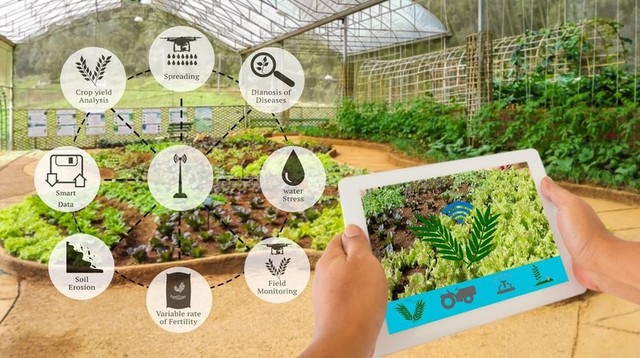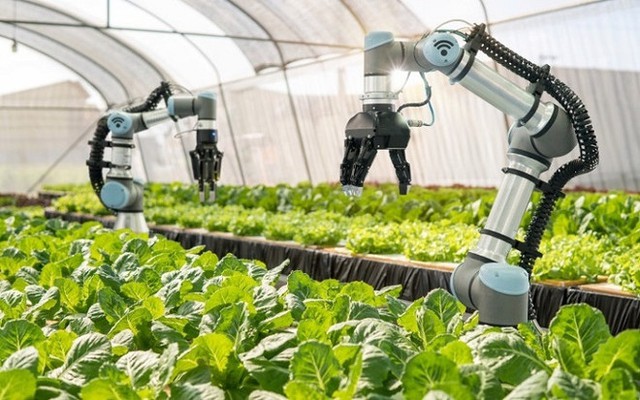Digital technology – An inevitable trend in Ha Noi’s agricultural production
VGP - Ha Noi has been strongly promoting the application of digital technology in agriculture by integrating artificial intelligence (AI), blockchain, remote sensing, and eGAP solutions to manage and trace the origins of crops, livestock, aquatic products, and supply chains.

Under Program No. 07-CTr/TU, dated March 17, 2021, issued by the Ha Noi Party Committee to promote science, technology, and innovation for the 2021–2025 period, the city has introduced a range of policies to encourage and support businesses, cooperatives, farms and households to invest in high-tech agriculture.
According to the Ha Noi Department of Agriculture and Environment, to date, Ha Noi has established 406 high-tech agricultural production models and 68 cooperatives applying advanced technologies under VietGAP and GlobalGAP standards, many of which are linking production and consumption through value chains to build brands and improve product quality.
About 20 enterprises have also begun investing in high-tech agriculture, focusing on seed production, agricultural materials, automation and deep processing.
The city also supports farmers in bringing agricultural products to e-commerce platforms, ensuring transparency in product origins while fostering the rural digital economy.
The Chuc Son Clean Fruit and Vegetable Cooperative in Chuong My Ward is among the pioneers applying digital technology to safe agricultural production. Covering nearly 18 hectares—12.8 hectares certified under VietGAP and 5 hectares under Global GAP—the cooperative has become a model for technology-driven and sustainable farming.
According to Director Hoang Van Tham, the cooperative has invested in greenhouses, automatic drip irrigation, and an iMentos 3.3AG weather monitoring station, enabling farmers to proactively adapt to climate change. Real-time updates on humidity, temperature, rainfall, and wind help optimise cultivation, irrigation, and fertilisation schedules.
The cooperative also uses FACEFARM software to manage the entire production process. Each vegetable bed carries a QR code for traceability, ensuring transparency and meeting consumer standards. Processing and packaging are conducted under HACCP standards to guarantee food safety and hygiene.
By adopting digital technology, the cooperative can closely monitor product quality and supply about three tons of vegetables per day to supermarkets, convenience stores, and collective kitchens, earning annual revenue of VND10–13 billion (US$380,000–493,000).
At Me Linh F-Farm, a pioneer in applying digital technology to orchid cultivation, owner Nguyen Thi Thuy said the farm operates a closed orchid care system using Israel's Industry 4.0 technology. The system features greenhouses and net houses with controlled environments, automated irrigation, propagation, and lighting adjustments—enhancing flower quality, reducing labor, and streamlining production.
Automatic drip irrigation, temperature and humidity sensors, and continuous cooling and ventilation systems help maintain optimal conditions for over 50,000 orchid plants, ensuring stable growth even in summer. Thanks to these technologies, the farm has minimized the impact of weather fluctuations while improving productivity and efficiency.

Expanding AI applications in agriculture
Despite encouraging initial outcomes, the digital transformation of agriculture in Ha Noi still faces obstacles. Challenges include small-scale, fragmented production; high costs for high-tech and Industry 4.0 applications; limited financial resources among farmers and investors; and inconsistent policy support from central and municipal authorities. As a result, investments remain scattered and often only address certain stages of the agricultural value chain.
To overcome these limitations, Ha Noi is accelerating digital transformation in agriculture through Plan No. 73/KH-UBND (dated March 12, 2025) on developing high-tech agriculture through 2030. The plan aims to modernise production, enhance efficiency, and promote sustainable agriculture by advancing digital transformation and applying AI and IoT technologies.
Deputy Director of the municipal Department of Agriculture and Environment, Ta Van Tuong, said the city will continue working with relevant agencies and local authorities to support cooperatives and enterprises in applying digital technology to agricultural production. Key efforts include digitising safe production processes, building transparent management systems, and establishing automatic monitoring networks to track, forecast, and adjust agricultural activities based on environmental and climate conditions.
Ha Noi also plans to develop a comprehensive database on crops, livestock, and aquatic products to guide planning and build large-scale, safe, and circular production zones. This will create added value for the capital's agricultural products while fostering a modern, circular, green, and smart agricultural economy, he added./.

